News & Updates Antiquarian Booksellers' Association
ABA History 1906-1984 (Part 1)
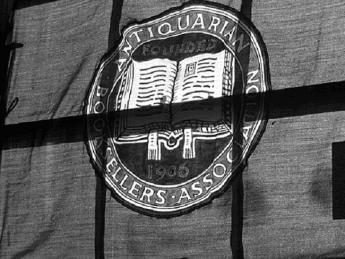
This short survey of the British ANTIQUARIAN BOOKSELLERS' ASSOCIATION consists of the account of its first half-century prepared by Dudley Massey for the fiftieth anniversary in 1956 (slightly revised) with a continuation to the present year by Martin Hamlyn. It was published in the ILAB Newsletter 36.
Part I: 1906-1956
(To read Part II of this article, please follow this link)
Frank Karslake
THE ANTIQUARIAN BOOKSELLERS' ASSOCIATION was formed in 1906 when a general meeting of booksellers was held at the Criterion Restaurant, Piccadilly Circus, on December 11th. Mr. Frank Karslake war the prime mover of the association and had in fact conceived the idea in 1902 when he had raised the question in his paper Sale Records :
"Why should there not be a Second-hand Booksellers' Association for the United Kingdom, similar to the existing New Booksellers' Association? Its object would be the safeguarding of the interests of the trade on vital issues. Union is strength."
In 1903, in the second issue of the same paper, he complains of the question being hung up for the present and of "great apathy" existing. However, in 1906 his wish was achieved and at the meeting at the Criterion, which he had organized, he related the activities of the embryo Society previous to the meeting and the objects to be attained by the formation of the Association that evening. He pointed out that there was a preliminary membership von 112, read out their names and quoted extracts from messages he had received from various well-wishers of the Association.
The company present then debated upon a suitable name for the body. Those who favoured "The Antiquarian Booksellers' Association" were defeated and it was decided to call it "The Secondhand Booksellers' Association", that the 112 booksellers whose names had been read out at the meeting should be considered original members, and that the Association should be constituted and a Committee and Officers appointed. The first committee consisted of 35 members, 16 from London and 19 from the country. It seems that from this large committee grew the advisory council which shortly became extensive with representatives residing in Amsterdam, the Hague, Antwerp, Paris, Leipzig, Leiden, Madrid, Lugano, Florence, Melbourne, Bombay, Cape Town and Christchurch, N.Z., besides numerous towns in the British Isles. In spite of this it does not appear to have been often appealed to. Mr. Henry N. Stevens, who took the Chair at the meeting, was elected to be the first president. Mr. B. D. Maggs had first been asked to preside but declined, but became its second president.
The official meeting place for the committee was at the Savoy Palace, Savoy Street, Strand. The newly appointed treasurer (Mr. Thomas Chatto) pointed out at the first meeting that the initial subscription of one shilling would be inadequate and proposed that this should be raised to five shillings. This was accepted. At the first committee meeting held on January 10th, 1907, it was decided that the Association could act as a debt agency, charging a fee of sixpence for any enquiries it made and charging commissions on any debts it collected.
The Clique
In the first year the Association persuaded Sotheby's to abandon sales on Saturdays, the auctioneers agreeing provided their book sales did not extend over a whole week. It was not so successful in its efforts to acquire control of The Clique, the proprietor declining to sell on any terms whatever. The Association, for its part, turned down the proprietor's suggestion that if the Association would agree not to support any of the publication of a similar character he would allow them to have the weekly use of a page and hand over to them fifteen shillings entrance fee which The Clique received. At a later meeting an offer from The Clique to provide four pages to the Association monthly for their notes and news was accepted.
It was barely a year before the title of the Association was changed and on May 11th, 1908, it became "The International Association of Antiquarian Booksellers." In 1910 a Benevolent Fund was formed and the first amounts put into it were the sums £3/3/9 and £3/9/4, profits gained from a Whist Drive and the Annual Dinner respectively. It was decided at this time that net profits from entertainments should be allocated to the fund.
Social Life
The Social functions of the Association were well patronised from the start. Dinners were held annually as well as whist drives and smoking concerts. In the early days at the dinners somewhat odd things happened: sometimes the members had to endure such nonsense as the Hon. Secretary appearing as the Pied Piper surrounded by fairies and children from fairyland. And the speeches and elaborate jokes of its first President now seem interminable and verbose.
In 1911 a series of lectures was proposed and in the autumn of that year the first "Beautiful Bindings-Ancient" was given by Mr. Cyril Davenport. In 1912 the first country member became president on the election of Mr. B. H. Blackwell of Oxford. At this time the Shops' Act caused a stir (a deputation of members gave their views to the Committee) and a petition was thereupon sent to the London County Council asking for the total exemption from compulsory closing on one half-day weekly of all antiquarian booksellers in London. Also in 1912 an exhibition was organised by the Association and held at the Stationers' Hall. It was opened by Lord Balcarres and a handsome catalogue was issued. At the meeting in January 1914 the Association subscribed to the German Trade Protection Society, an unfortunate year to have taken out this subscription. In that year also a prominent Charing Cross Road member asked whether steps could be taken respecting rubber dealers in that area. It appears they could not.
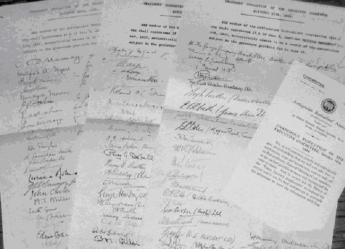
1914-1918
At the first meeting after the start of the 1914 war a resolution was passed that it was undesirable that book auctions should be held during the remainder of the year. At the November meeting £ 25 was donated by the Association to the Belgian Book Trade Relief Fund. Reference is made to Sotheby's withdrawal of credit in 1915 and in the September of that year the Committee were moved to protest to the Chancellor of the Exchequer against the proposed abolition of the half-penny post. During the war help was provided by the Association to its members in such matters as paper control and prohibition of catalogues. A special meeting was held on March 11th, 1918 when Mr. W. H. Evans of the Department of Overseas Trade addressed the members regarding the trade in second-hand books, and complained that he had been unable to detect any concerted attempt on the part of British booksellers to take advantage of the present situation with a view of contesting the re-establishment of German predominance after the war. The propaganda effect of the speech was considerable but it is doubtful if it went beyond that; the gradual decline of the power of the German book trade was evident after the war, and it was effectively finished off by Hitler.
In 1917 the first reference to the American [New] Booksellers' Association is made when fraternal messages were exchanged on the efforts to keep up business in difficult times.
The First ABA Secretary
In 1920 Mr. Karslake the Hon. Secretary died ; he had held this office since the Association's foundation. His daughter was appointed in his place and paid a salary and the Association from henceforth employed a secretary. To meet the cost of employing a secretary the subscription was raised from five shillings to half a guinea. In this year the austerity of the war years was abandoned and it was proposed that concerts, lectures and whist drives should be held in the winter months, and during the summer, excursions to places of literary and antiquarian interest. The first of these excursions was to Oxford. This was followed by visits to Bath and Cambridge and at each city the local members entertained their visitors. A suggestion made at this time that print dealers should join the Association did not get beyond a Committee enquiry. The importance of remainders was always apparent and as late as 1923 the Association tried to regulate the selling prices of remainders and to prevent underselling in connection with them; meetings were held with the Associated Booksellers to try to fix remainder prices.
At the annual general meeting in 1924 a motion to change the name of the Association to "Antiquarian Bookmen's Association" was, happily, heavily defeated. Much time at the meetings of 1925 was given up to the net book agreement and many members signed a form of acceptance compiled by their president Mr. (later Sir) Basil Blackwell. The Committee had previously, in two resolutions, approved the terms of the Net Book Agreement. In the same year a dinner and theatre evening was itemized in the minutes ; seats in the circle of the Alhambra 3/6 each, dinner at Pinoli's Restaurant at 3/9 per head, 6d per person gratuity (to be paid in a lump sum) to the waiters and the provision of free programmes would allow tickets being issued at 8/6 each.
A start on the collecting of confidential lists of names of doubtful persons to be sent to the Secretary began to take shape in 1926 when a confidential enquiry was sent to members. Earlier references to this subject show that before this date the service was meagre (a list of surnames only was circularised in 1908) and though the enthusiastic Frank Karslake refers to keeping a register of such cases it did not appear to have been adopted by the Association. Later in 1926 a burglary at a New Oxford Street shop raised an important question when the insurance company contested that prints (of which £ 170 worth were stolen) were not part of a booksellers stock-in-trade. The Association took up this point with the company, submitting as evidence a volume of B.A.R. which recorded sales of Baxter and other prints, and a copy of The Clique in which was published a notice warning members to examine their policies and to inform their insurance companies that prints as well as books were part of their stock-in-trade. A scheme for training and certificating of apprentices, like the one submitted to the Associated Booksellers, did not materialise. In 1927 a new Directory of Booksellers was prepared and all non-member firms who appeared in it were circularised; as a result 39 firms joined the Association in the months of May and June. In the past different issues of the Directory had been published and sold by the Association and as far back as 1906 Mr. James Clegg offered to sell his International Directory of Booksellers to the Association but it was declined. There is no record when the Directory was replaced by a list solely of members.
Antiquarian Booksellers’ Association (International)
At the Annual General Meeting in 1928 the name of the Association was changed to the one which it now has ; it is interesting to point out that it was first proposed to call it the "Antiquarian Booksellers' Association" and an amendment that the word "International" be placed in parenthesis after the title was only carried by nine votes to five. The vote emphasises how poorly the meeting must have been attended. A circular letter to booksellers in the British Isles and abroad produced 27 new members in July, mostly from abroad. In 1930 the Association had its first foreign President when Mr. Gabriel Wells of New York was elected. At the first meeting after his election a letter from a continental member came before the Committee; he complained that the Association was not sufficiently international and that they had no medium through which members could voice their opinions: these and other points were refuted by the Committee. In May 1930 Henry N. Stevens, the Association's first president, died. At the annual meeting in 1931 the Association elected its first Scottish president (Mr. Hugh Hopkins of Glasgow) and a vice-president, Mr. Albert Myers, who began his lengthy tenure of office in this capacity. The decision followed the recent election of an American president who was often absent, a situation which indeed proved noticeable during this first Scottish presidency.
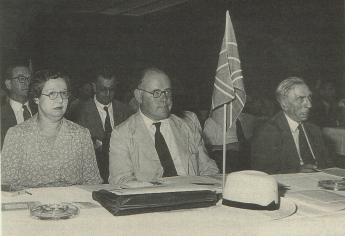
M. Evelyn Banks – First Woman President
In the following year the Association chose its first woman president and Miss M. Evelyn Banks took the Chair. Also in 1932 a member queried the right of H.M. Stationery Office to sell their publications at reduced prices to public libraries and universities and not allow a similar reduction to the trade ; the old files of the Association were destroyed as waste paper by a vote of the Committee ; and a legacy of £ 200 five per cent debentures in The Clique bequeathed to the Association by Mr. F. E. Murray was confirmed. In 1933 a Provident Fund was started with a nucleus of £ 25. Efforts to turn the Association into a Trade Union, however, failed.
In 1935, at the annual meeting, a motion to allocate five per cent of the subscriptions received each year to the Benevolent Fund was carried. In 1955 owing to the flourishing state of the fund this rule was relaxed, but restored in 1957. During 1935 and 1936 difficulties of receiving payment from Germany are referred to. At the January 1936 meeting the President deplored the treatment of "our Jewish confreres in Germany" and the Association joined with the new booksellers' and publishers' associations in sending a letter of protest to the suitable authorities. After this concern about the treatment of Jewish booksellers it is somewhat disturbing that one member wrote protesting about foreign booksellers starting businesses in this country. The Committee unanimously refused to accept this view and agreed that such booksellers increased trade by settling in England.
In 1936 the subscription was raised to fifteen shillings. In July of that year the Secretary was instructed to write to the Dutch Antiquarian Society for particulars of their Association and in October the President reported on his visit, on behalf of the Association, to the Dutch Booksellers' Exhibition in Amsterdam. It is interesting to note that arising out of this the question of affiliating with foreign booksellers associations arose, but after discussion it was agreed to take no action. This was a foreshadowing of the International League.
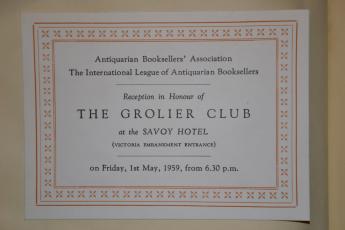
"Increasing the activities and dignity of the Association"
A year after the subscription had been raised it was proposed that it should be substantially raised again - to two guineas, for the purpose of, in the words of the proposer, Mr. Lionel Robinson, "increasing the activities and dignity of the Association." This proposal was accepted after considerable discussion and it is interesting to note that those who thought that the increase would mean that members would resign were wrong ; in fact there was an increase in membership. To tide over the time before the new subscriptions took effect an expansion fund was started and £ 60 collected immediately. Proposals for raising the prestige of the Association included revision of the rules, issuing cautionary lists, qualification of membership (that members should be persons of integrity not only in methods of payment but also in the authenticity and reliability of the goods they offered), a new edition of the Directory, advertising and publicity and the publication of a newsletter. At a subsequent meeting an Investigation Sub-Committee was proposed with power to investigate fakes; but this motion was lost. What was described as "Divisional or Local Representation" was also discussed but appeared to lack the drive of those members who formed the Northern Branch in 1948. The Association issued its present badge in 1937 ; efforts to get a design from Eric Gill were unsuccessful and one submitted by Mr. Frank Howse was chosen. Efforts to obtain some concessions through the Chamber of Commerce in connection with the proposed Anglo-American Trade Agreement affecting the duty on books less than 20 years old imported into the U.S.A., or a reduction in duty, were pursued. Another suggestion which was then thought abortive was the forming of an Assistants' Association to be affiliated to the A.B.A.
The Sunday Times Book Fair
In 1938, under the presidency of Mr. Lionel Robinson, the drive to further the prestige of the Association continued and the newly formed publicity sub-committee were empowered to spend £ 150 on advertising during the year. The most important work of the Association during 1938, however, was the exhibition it put out at the Sunday Times Book Fair; a catalogue of the exhibition was issued. Efforts were also made to send exhibits to the World's Fair, New York, but it was considered too expensive; however, the President arranged that the A.B.A. should be represented through the good offices of a few members and some private collectors who were able to send the choicest rarities. The Sunday Times Book Fair was a great success and many members found that it brought them business, but the Association's efforts to secure a series of broadcast talks did not materialise as the B.B. C. did not think these would be of sufficient interest. Nor in 1939 was a member successful who hoped to arrange a television broadcast on rare books.
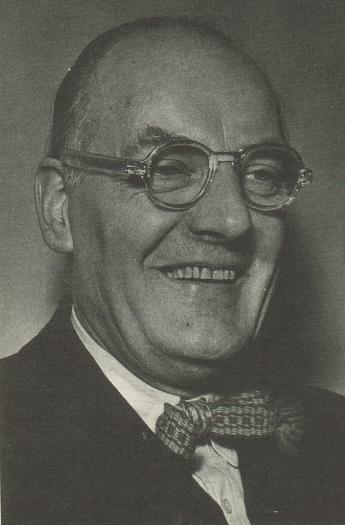
War Time
In 1939 the plight of the antiquarian booksellers in Germany and Austria under the Nazi terror was brought forcibly before the Committee. These men had already lost their businesses and now, as the records state, "in some cases their lives were actually in danger and at best they would probably be sent to a concentration camp." They appealed to the Association for help. It was therefore proposed that the Association should guarantee, during their stay in England for a period not exceeding twelve months, those persons whose names had been mentioned ; and that any expenses they incurred be met by a fund guaranteed by members. A sum of £ 460 was at once arrived at by individual guarantors.
In the same year it was agreed that a larger stand at an increased cost should be taken at the Sunday Times Book Fair. The publication of a pamphlet on book collecting edited by Mr. John Carter was discussed, but the cost was thought prohibitive in view of expenses elsewhere and it was held over. It so happened that much else had to be held over and the outbreak of war on September 3rd called for a special meeting. The Sunday Times Book Fair was abandoned. An immediate problem confronted the trade when the rates of the compulsory war risk insurance scheme thought the Board of Trade were known. It was obvious that this was entirely beyond the capacity of any bookseller and steps would have to be taken to get the premium drastically reduces.
The Association did its share in persuading those in authority to change their minds and it was decided that antiques, in which rare books over 50 years old were included, should be exempted from the scheme. The varied war-time acts and regulations affected the antiquarian book trade much as they affected everybody else. As the war effort became paramount these became more stringent and the Association did what it could for its members; it could, more often than not, carry more weight with Government departments than could the individual bookseller. Examples of such help were: release from internment of some foreign members domiciled in England; enabling key men in firms to get various stages of deferment from military service ; assistance with licences and exchange control and securing for its members a licence for cheaper books in lieu of using C.D.3. forms. In this capacity the Committee formed itself into an export group under the auspices of the Board of Trade to obtain the licences. A further concession was that books could be sent on consignment, thereby relaxing the "firm order" limitation originally shown on the licences.
Some bookshops were destroyed and many damaged by the air raids and Mr. Leslie Chaundy of Dulau's was killed when his shop in Dover Street received a direct hit. The Benevolent Fund was quickly increased to be more effective in meeting a possible heavy demand on its reserves and a sale of books organized by the A.B.A. was held at Hodgson's on July 3rd, 1941, in aid of booksellers who suffered loss from the air raids. A great many members, as well as collectors and other booksellers sent books; the catalogue was printed by The Clique at no charge and about £ 600 was realised. A leaflet sent out to collectors and others also brought in money for the fund. Later the flying-bomb attacks took their toll; two booksellers lost their lives and some shops were damaged. Amounts from the benevolent fund were placed at the disposal of those who lost stock or business.
The various changes in bulk licences led to a sub-committee calling on the Board of Trade to try and clarify some of their rulings. One member had a vision of the red light ahead and sent in a memorandum on Government restrictions and of possible post war policy. The Committee, at that time, 1944, thought these could only be dealt with as they arose, but later they joined their name with other associations making representations for the removal of controls after the war.
The international status of the Association was most pleasantly revived at the January meeting in 1945 when a letter was read from a French member (the first from liberated Paris) asking about his membership; he was informed that he was still a member with a paid up subscription to the end of 1944.
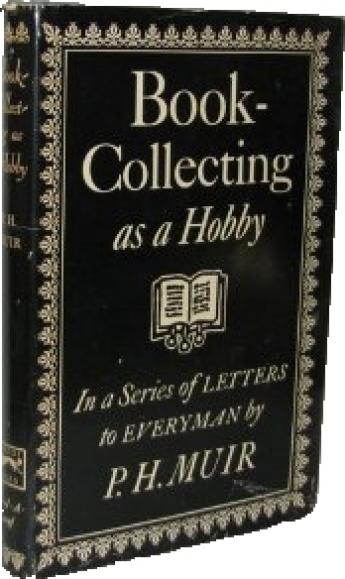
“Book Collecting as a Hobby”
In 1945 appeared a book the germ of which started during the war, when the president, Mr. Mark Cohen, voiced the idea that a book should be published to foster book-collecting. Much thought was given to this subject and publishers and writers were approached. The general opinion favoured a popular book at a low price. The idea finally took shape when the National Magazine Company showed interest and agreed ·to print 10,000 copies, providing that the book could be written in two months. It was then proposed that Mr. Percy Muir, a member of the Committee, who had helped a great deal on the project, should write the book himself, that it should be called Book Collecting as a Hobby and that all arrangements for its publication "should be purely between Mr. Muir and the publishers." During the same year is recorded the public-spirited generosity of two booksellers, Mr. Smith and Mr. Benger, formerly of Messrs. Ellis, in presenting the Machlinia Primer to the Bodleian Library.
The First ABA Newsletter
In 1945 requests that a resume of the Committee's activities should be sent to members revived the idea of a news letter. This was issued in the form of a leaflet, at first entitled "What your Committee is Doing," consisting of a resume of three Committee meetings. Following this it was decided by a referendum that since the Association had its own news letter, The Clique should no longer describe itself as "the official organ of the Association." A rule governing this point to enable Mr. Murray, the proprietor, to remain on the Committee was passed.
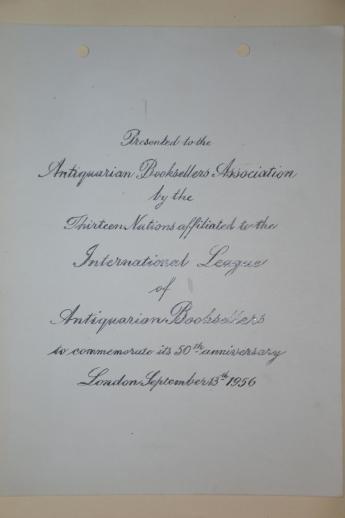
The ABA and ILAB
The Association began to resume its social activities, suspended during the war, and in 1947 a lunch was held at the Dorchester Hotel. The chief speaker Sir Harold Nicolson gave perhaps one of the best speeches delivered at any A.B.A. function. In this year the president, Mr. Percy Muir, a few members and the Secretary attended a conference of antiquarian booksellers in Amsterdam at the invitation of the Dutch association. This was first mooted by the Dutch booksellers in September 1946, when they wrote inviting the A.B.A., as the oldest association, to arrange a conference in Holland to which as many antiquarian booksellers' associations as possible should be asked to send representatives. The British President was invited to take the Chair and thus the seeds of the International League of Antiquarian Booksellers were planted. It was decided that a second conference in 1948 would be held in Copenhagen and the A.B.A. were asked to submit ideas on suitable laws for establishing an international organization.
A lengthy resolution was approved to be sent to the Danes for the agenda. It proposed that the other national associations should affiliate themselves to the A.B.A. and incorporated suggestions on the powers of voting and methods of finance. It is not surprising that this insular-minded document was rejected by the Conference and sensibly withdrawn by the British delegation. It was at this meeting that the International League was formed. Mr. Percy Muir, past-President of the A.B.A., was elected Vice-President and it was decided that the first Conference of the League should be held in London in 1949. This was a great success ; a special fund was subscribed to meet part of the expenses, functions included a reception and dinner in the Guildhall Library at which the acting Lord Mayor was present ; visits to the Royal Library at Windsor Castle ; Cambridge; Beeleigh Abbey (at the invitation of Mr. W. A. Foyle); the British Museum; and a farewell dinner and dance in London. Over 50 delegates and their wives and friends from nine European countries attended the conference and an observer from the United States.
During more recent years the part played by the International League has grown in importance in the annals of the Association. Subsequent conferences have been held in Paris, Brussels, Geneva, Milan, Vienna and New York and the tenth Conference took place in 1956 in London as part of the celebrations of the Association's fiftieth anniversary. A directory of all firms who are members of the Associations affiliated to the League and a dictionary of antiquarian booksellers' trade terms have been published. At times, particularly at the beginning, there has been some criticism of the cost of the League but gradually this has dwindled as it is realised that the business and good will which the League brings to the Association outweigh its cost. Two members of the A.B.A. have been President of the League, Mr. Percy Muir was its second and Mr. Stanley Sawyer, now [1956] in the Chair, its fourth.
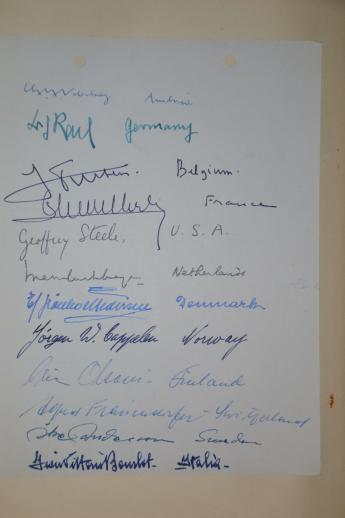
ABA Lectures
During the winter of 1948-9 the first series of A.B.A. lectures was held at the National Book League, interspersed with two or three debates, and they proved most successful. The lectures were subsequently published by Messrs. Cassell & Co. under the editorship of P. H. Muir, the chief organizer of the series. In the following winter a second series was held and proved in most cases as successful as the first but the difficulty of obtaining lectures on suitable subjects became apparent and a new scheme of annual lectures was supplemented. These were organized by Mr. Ifan Kyrle Fletcher. The first was given by Mr. Michael Sadleir, the second by Mr. A. N. L. Munby and the third by Mr. Clifford Maggs. These lectures led to another new departure, the A.B.A. Annual, kindly printed by Messrs. Dawson at no cost to the Association. Members and collectors contributed articles and the first two lectures were issued in the two annuals published. The publication of a third annual was abandoned through lack of sufficient support. These excellent ideas called for much organisation and though welcomed by the great body of the members they could not succeed unless supported by hard work and mental exertion.
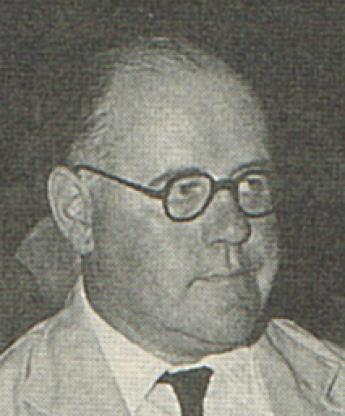
Laws and Taxes
The Newsletter has grown from its first brief appearance of a general summary of Committee meetings into a printed pamphlet issued once a year. This infrequency was due to the cost of printing and, here again, to the lack of contributions from the members.
In 1948 a member from Manchester wrote to the Committee stating that members in the North of England would like to hold meetings. Thus was born the Northern Branch, one member of which was co-opted as a member of the Executive Committee. The man behind this idea was Mr. R. F. Gibb of Manchester. One of the results of its formation was an annual dinner held either in Manchester, Southport or Birmingham at which members from London and the South met members from the North of England. This excellent idea spread to the South; organized dinners have been held in Brighton, Hastings and Bournemouth. It is interesting to note that as early as 1911 an Eastern Branch was formed based on Cambridge.
At about this time a notable success was achieved by the Association when H. M. Customs endeavoured to extract tax and duty from a member on a book because the plates belonging to it were issued separately. After a long dispute which ended by taking Counsels' opinion the Association won on both points. They were able to quote this case to good purpose a second time when Customs tried the same practice again. Another regulation affects the export of manuscripts and insists that if required to do so the exporter must supply photostats or microfilms of them, the cost of which must be borne by the exporter (or his customer). Every effort has been made by the Association to place some embargo on the use of the copies taken, and to have the cost paid by the museum or library demanding them. The Benevolent Fund, with its own rules and trustees adopted in 1950, has grown into something of substance. Its capital assets in 1956 were over £ 2,500 and luckily it has had very few calls on its resources.
The publication of a confidential list, always one of the Association's primary functions, can be a tricky business. A certain risk must be run to supply this invaluable service to the members. Legal advice has had to be taken from time to time and a warning from the Association's solicitors "that some members might be using the list rather too lightly", and emphasising the private and confidential character of these lists, should be recorded.
The ABA Library
The A.B.A. Library is another asset that has materialised in these years. The question of forming a library is first recorded in 1946 with a suggestion that one useful to the Association might feasibly be combined with the National Book League's reference library; but this was found to be impracticable. The library really took shape, however, when, by the great generosity of an American member, Mr. Arthur Swann of New York, several large consignments of reference books and catalogues were sent to the Association. For about a year some of the books were housed in the Association's office but when Mr. Charles Howes of Hastings kindly offered to take charge of the library and organize a lending service from his shop, the books were sent to him. A typed catalogue was issued and many other members have donated books to its shelves.
It is hoped that this short history of the Antiquarian Booksellers' Association will show to some extent what the Association has achieved during its first fifty years.
The historical survey was published in the ILAB Newsletter 36.
